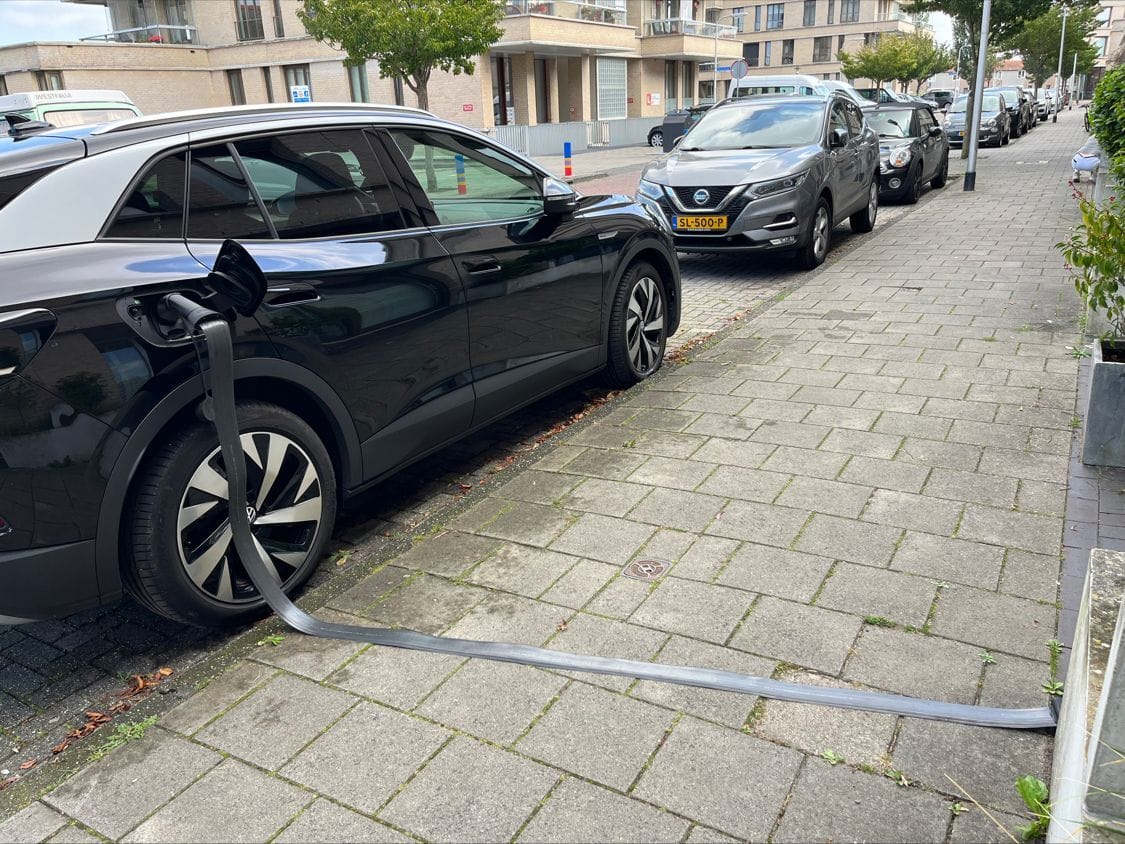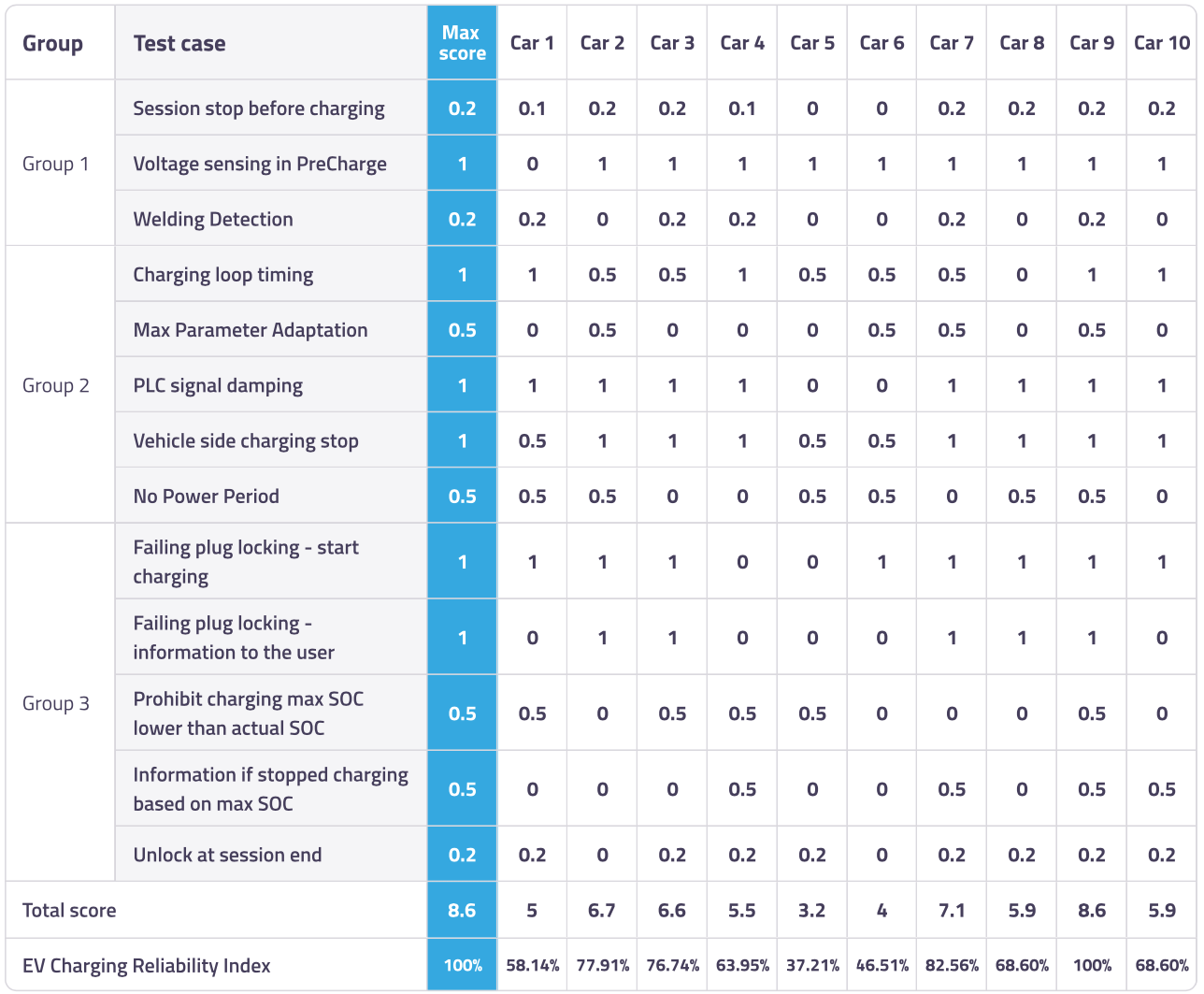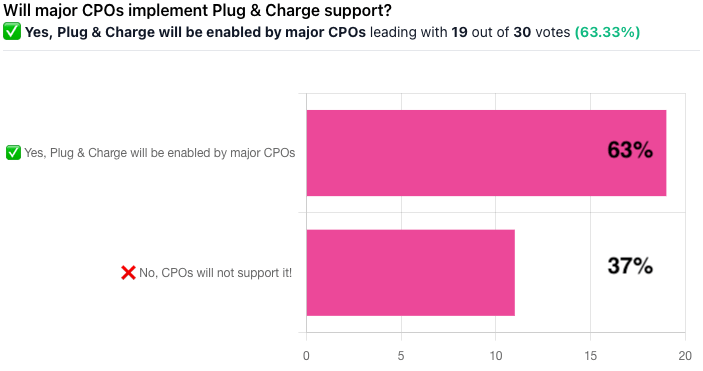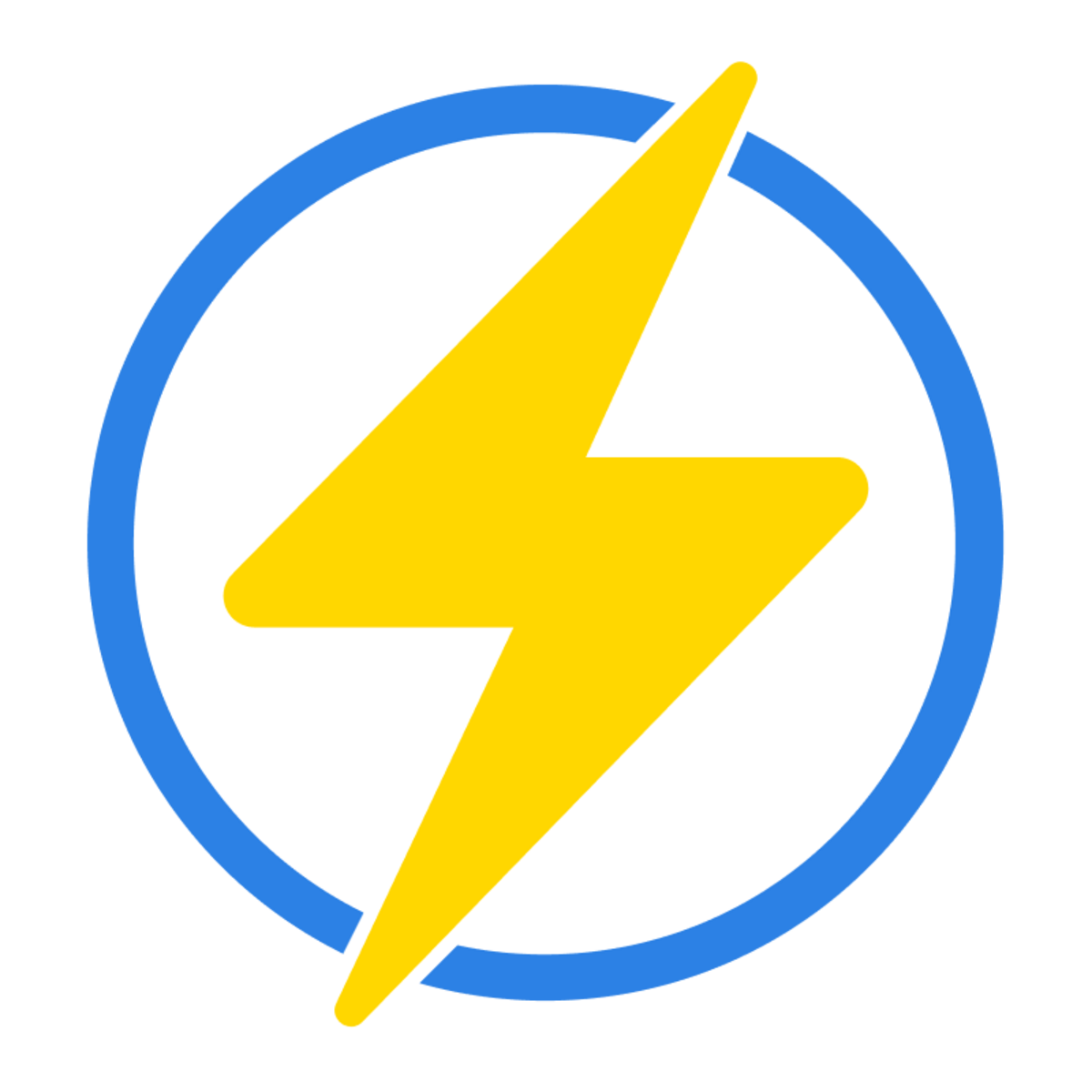Happy Monday. This is Electric Avenue. The only e-Mobility newsletter that’s crispy, crunchy, and tasty like a fresh french baguette from Paris. 🥖
Here’s what we have for you today:
2 Pics 📸
Reader Survey update 📝
Charging Reliability - the cold, hard facts ❄️
Voting Results - Plug & Charge Adoption by CPOs 🗳️
3 Links 🔗
Meme of the week 🤡
Let’s get this bread!
2 Pics 📸

Flatpower curbside charging cable solution. Photo Credit: Rustam Kocher
The pic above shows a very interesting Charging solution for folks who need to get power to their electric car across a sidewalk.
It’s a charging cable from a company called “Flat Power”, made in Italy.
According to this LinkedIn post, it is a city initiative (Noordwijk, Netherlands) to test out the cable, exclusively for people who have solar panels at home, as it relies 💯% on solar power.
The cable is part of a one-year trial program in this small coastal town, to gauge the effectiveness and safety of the solution.
We love the concept! It reminds us of this on-street overhead EV charging arm by Dutch company ChargeArm.

Overhead charging arm by ChargeArm
Reader Survey Update 📝
Last month we celebrated our very 1st birthday at Electric Avenue. To celebrate, we had a 2x $50 (or EUR) Amazon gift card giveaway for those who participated in this quick reader survey.
The two lucky winners have now been informed via email. Congrats!
Also, if you haven’t yet - please still participate in the survey, as we really appreciate your feedback!
Charging Reliability - the cold, hard facts ❄️
Have you ever experienced a problem at the start of a charging process like for example a connector that was not fully locked to the vehicle? Or did you enjoy your coffee and when you came back to the car you noticed that the charging process was interrupted? 🪫😕
According to a recent interview with an SAE representative who researched the topic of charging reliability within a task force including some US CPOs, about 25% to 30% of charging sessions at public charge points fail. While many reports primarily blamed the charging network operators and charging station manufacturers, we must not forget that immature implementations on the vehicle side can also hamper the charging experience.
To take a data-driven approach to this, Munich-based startup EcoG initialized a Charging Reliability Index (CRI) that aggregates their test results with various electric cars in a report. We saved you some time and summarized the cold, hard facts from the 37-page long report 📑.
Why is testing for charging reliability so important?
The power line communication interface between the charging station and the electric vehicle (EV) is required to set up and control the electrical power flow which can change rapidly.
Technical errors during a charging session can rarely be fixed on the spot via customer support teams which leaves the EV drivers stranded without being able to charge the car.
What is the Charging Reliability Index (CRI) report about?
EcoG aims to improve the e-mobility user experience by making transparent the importance of reviewing the implementation of the charging communication interface between the charging station and the electric vehicle.
The CRI shall serve as a tool that allows companies to grasp the intricacies of charging reliability.
EcoG sets out the goal of 99.99% charging reliability which the EV charging industry must aim for and can only reach by cross-industry collaboration.
Now let’s jump into the details of the CRI 🔎
The Charging Reliability Index (CRI) is based on 13 tests which are divided into three categories and summarized into a weighted score:

Charging Reliability Index (CRI) - Test Categories // Source: EcoG - Technical Report
Charging Initialization: Three test cases focussed on the start of a charging process.
Charging Process: Five test cases focussed on a stable charging control of the EV including fluctuation in the charging station’s power output and disruptions.
User Communication and Prevention of Errors: Five tests on user interactions and communication for charging status and in case of errors.
Within each category, several tests were conducted which are described in detail within the full report. For the initial report, a selection of 10 EU vehicles with CCS-connectors (each from one brand) with high adoption rates were tested. Unfortunately, the cars are anonymized but one can see the significant variance in the test results ranging from 37% up to 100% (see screenshot below for tests and results).

Charging Reliability Index - Test Results // Source: EcoG - Technical Report
➡️ If you want to learn more details about the test cases, you can read the full report from EcoG.
🗳️ Voting Results - Plug & Charge Adoption by CPOs
Last week, we asked y’all to vote if major CPOs will implement Plug & Charge support. Here are the results from 30 votes: 🤩

✅ 63,33% voted that Plug & Charge will be enabled by major CPOs!
We also received some write-ins with people’s votes which were really interesting:
#1 - Voted ✅: “Plug&Charge adoption is trending favorably in both Europe and North America. The recent NEVI requirements have accelerated demand for PnC in North America; however, resourcing will be a rollout constraint among CPOs.”
#2 - Voted ❌: “The question should be at what cost. Will it be similar to roaming which gets killed by direct payment!?”
#3 - Voted ✅: “The ones who are active in the Nordics first, then Southern Part of Europe... Rest will follow. 😅 ”
📣 Do you want to share your thoughts on the Plug & Charge rollout in a guest article? → Drop us an e-mail at [email protected]
3 Links 🔗
Going high voltage, confirmed⚡: The rumors are true! Mercedes-Benz confirmed at the IAA auto show that its upcoming CLA electric car will feature an 800V battery architecture. It’ll also support DC bi-directional charging. Not too surprising, as the company was looking to hire a Technical Project Lead for a DC Bidi wallbox just last month.
IONITY adds Ekoenergetyka🔌: The largest Pan-European highway fast charging network IONITY is updating its list of charger suppliers. IONITY’s iconic halo charger dispensers have thus far been produced by ABB and Australian company Tritium. Now IONITY has announced that Ekoenergetyka from Poland will join the club. This comes in addition to the recent announcement that IONITY will start deploying the 400kW HYC400 charger from Alpitronic.
Tesla grabs NEVI funding🤑: A WSJ report describes what many already assumed - Tesla can deploy Superchargers as sector-leading costs. This, in combination with the magic dock adapter, has led to Tesla winning ~$8.5M in US federal funding for new sites across 5 states. Tesla’s bids go as low as $17k per fast charger for a site in Maine, where an unnamed competitor had to budget $130k per fast charger…
Meme of the Week 🤡

That's a wrap for this week! Let us know how you feel and leave some feedback. (We read every single one of these🙂 ):
What do you think of today´s edition?
Reader Review of the Week
Selected ⚡️⚡️⚡️ Pretty decent on ⚡ How is the Plug & Charge Rollout going so far? and wrote:
"The problem with PnC is the blooming madness of the protocols (Gireve with its own implementation?) and the UX that has not been thought through any further! Can I now select the PnC contract at the charging station? After all, ISO 15118-20 stipulates having several certificates on the vehicle? Or do I have to do this before/after plugging in the vehicle's head unit? Can I do this via the app? How can I end the charging process? From the vehicle? Via the app? At the charging station (as used to be possible for EVERYONE with Ionity?) Questions about questions...” (Translated from German)
Someone forwarded this to you? Subscribe now - it's free!
Looking to start your own newsletter? Sign up for Beehiiv now!
DISCLAIMER: None of this is financial or tax advice. This newsletter is strictly educational and is not investment advice or a solicitation to buy or sell any assets or to make any financial decisions. The Electric Avenue team may hold investments in or may otherwise be affiliated with the companies discussed.


